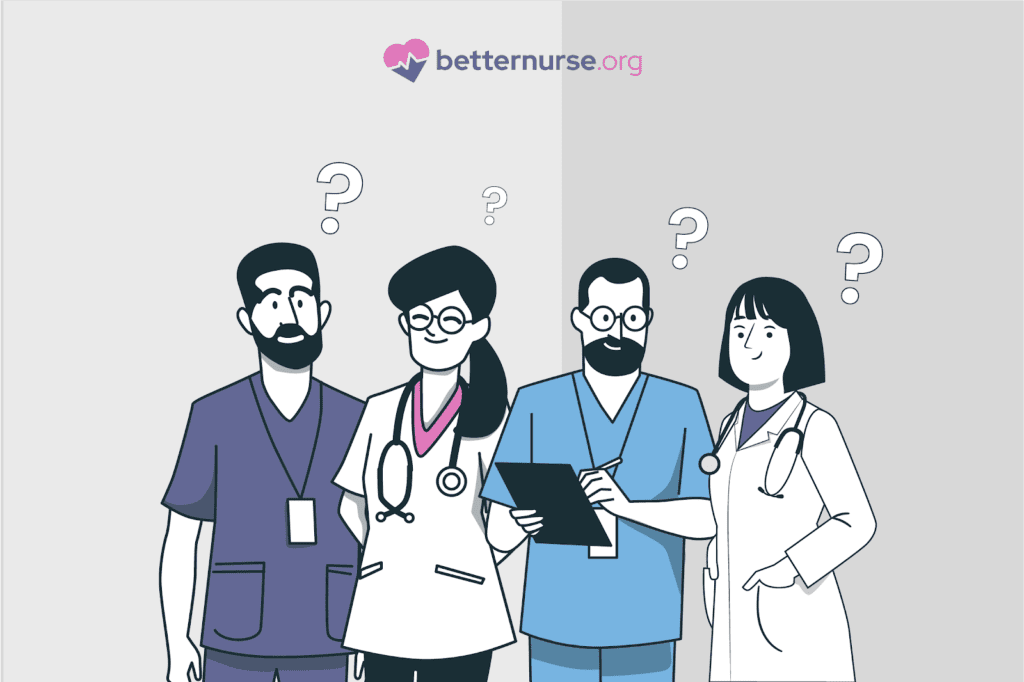The number of years of college required to become a nurse depends on the level of nursing education one pursues, and it ranges anywhere from one to four years.

The answer to “How many years of college to be a nurse?” depends on your chosen nursing program and career goals. Becoming a registered nurse (RN) requires two to four years of college, depending on whether you earn an associate’s or a bachelor’s degree in nursing. Additionally, by completing academic coursework, aspiring nurses must gain clinical experience and pass the National Council Licensure Examination (NCLEX-RN) to receive their nursing license. This article will explore the educational paths available to aspiring nurses and guide how to achieve their career goals in this rewarding and in-demand field.
Table of contents
Takeway
Becoming a nurse is like embarking on a marathon: it requires stamina, dedication, and endurance. While the journey may be challenging, the rewards of making a difference in the world are immeasurable. So lace up your sneakers and start training.
What Does a Nurse Do?
Nurses play a crucial role in the healthcare field and are essential in providing high-quality and compassionate care to patients. They assess patients’ health conditions, develop and implement care plans, administer medications and treatments, and monitor patients’ progress.
Nurses emotionally support patients, advise them about their health needs and treatments and advocate for their rights and well-being. They work in many healthcare settings, including hospitals, clinics, and private practices.
How Do You Become a Nurse?

Becoming a nurse necessitates determination, diligence, and a desire to serve others. One can follow different academic routes, such as earning a diploma in nursing, an associate’s degree in nursing (ADN), or a bachelor’s degree in nursing (BSN) to achieve their goal.
After successfully completing an accredited nursing program, aspiring nurses must pass the National Council Licensure Examination (NCLEX) to receive a nursing license. Furthermore, to specialize in one concentrated field, such as pediatrics, geriatrics, or critical care, nurses can pursue additional training and certification programs.
So let’s go through these steps together.
Choose a program
When selecting a nursing program, there are numerous aspects to consider, even though it might seem overwhelming. Initially, determine which type of nursing degree you want to pursue, such as a diploma in nursing, an ADN, or a BSN.
Subsequently, assess the program’s accreditation, which verifies that it meets the national standards for nursing education. Thirdly, examine the program’s location, schedule, and cost since these elements can impact your ability to finish the program and your financial situation. Finally, weigh the program’s reputation, student outcomes, and support services, as these factors can affect your achievements as a nursing student and your career opportunities after graduation.
Take the NCLEX-RN exam
The NCLEX-RN is a standardized exam that aspiring nurses must pass to obtain a nursing license. The exam assesses the knowledge and skills necessary for safe and effective nursing care.
To prepare for the NCLEX-RN, candidates can enroll in test preparation courses, review study materials, and take practice exams. The passing score for the NCLEX-RN varies by state and is typically between 75 and 85%. By adequately preparing for the exam and taking it seriously, aspiring nurses can improve their chances of success and start their careers in nursing.
Get specialty certifications
Nurses can become more marketable and competitive by obtaining specialty certifications that enhance their knowledge and skills in specific nursing areas. These certifications require additional training and vary depending on the type of certification.
Certification in critical care, pediatrics, oncology, and geriatrics, among others, can be obtained through organizations such as the American Nurses Credentialing Center or the Oncology Nursing Certification Corporation. Specialty certifications show a commitment to ongoing learning and excellence in nursing practice. Employers may offer higher pay or incentives for nurses with specialty certifications.
How Long Does It Take To Become a Nurse?

The time it takes to become a nurse can vary depending on the chosen educational path. A diploma in nursing typically takes 1-2 years to complete, an ADN takes 2-3 years, and a BSN takes 4 years.
After completing an accredited nursing program, aspiring nurses must pass the NCLEX to obtain a nursing license. The exam itself takes approximately six hours to complete and consists of up to 265 questions. After taking the exam, results are typically available within a few days. Additionally, nurses can pursue specialty certifications and further education to advance their careers.
Bachelor of Science in Nursing
Typically, a BSN program takes four years to complete if pursued full-time. However, some programs may offer accelerated options or allow for part-time study, which can impact the time needed to complete the degree. Additionally, individuals who already hold an associate’s degree in nursing may be able to complete a BSN program in a shorter period through a bridge program.
Associate of Science in Nursing
An Associate of Science in Nursing (ASN) degree program typically takes two years to complete if pursued full-time. Part-time study options are also available, but the length of time needed to complete the degree may vary. An ASN degree can be a good option for those looking to start a nursing career with a shorter time commitment than a BSN program.
Nursing diploma
A nursing diploma program is usually offered by hospitals, vocational schools, and community colleges. It gives students the necessary skills and knowledge to become licensed practical nurses (LPNs) or registered nurses (RNs). The length of a nursing diploma program can vary depending on the program’s curriculum and clinical requirements. Some programs offer specialized training in a particular area of nursing, which consequently requires additional time to complete.
Accelerated program
Universities and colleges usually offer accelerated nursing programs and require a full-time commitment. An accelerated nursing program is designed for individuals who have earned a bachelor’s degree in a non-nursing field and want to transition into nursing.
These programs typically take about 12-18 months to complete and offer an intensive curriculum that covers nursing theory, clinical practice, and leadership skills. The program’s duration can vary depending on the institution and the student’s course load; however, students complete the program within a year and a half.
Does It Take the Same for All Kinds of Nurses?

How long it takes to become a nurse can vary depending on the educational path chosen and the type of nurse they aspire to be.
How many years of college to be a nurse practitioner?
Becoming a nurse practitioner typically takes six to eight years of a college education. This includes earning a BSN degree, obtaining a registered nursing (RN) license, completing a master’s degree program in nursing, and passing the nurse practitioner certification exam.
How many years of college to be a pediatric nurse?
Pediatric nurses must obtain an ADN or a BSN degree, obtain an RN license, and gain additional training and certification in pediatric nursing. The time to complete these requirements ranges typically from 2 to 4 years of college.
How many years of college to be a registered nurse?
To become a registered nurse typically takes 2 to 4 years of college education. This includes earning an ADN or BSN degree and obtaining a nursing license by passing the NCLEX-RN.
How many years of college to be a travel nurse?
Becoming a travel nurse includes:
- Earning an Associate Degree in Nursing or a Bachelor of Science in Nursing.
- Obtaining a registered nursing (RN) license.
- Gaining some clinical experience in the nursing field.
Usually, it takes around 2 to 4 years of college education to start practicing as a travel nurse. Additional certification and licensing requirements may also apply, depending on the state and specific travel nursing assignment.
Wrapping Up
In conclusion, becoming a nurse requires a commitment to education, hard work, and dedication. The time it takes to become a nurse varies depending on the chosen educational path. However, with the right preparation and training, individuals can obtain a nursing license and pursue a fulfilling career helping others in the healthcare industry.

Nurse Luke is a CRNA who specializes in Nursing content and still enjoys a very busy career with Locum, Per Diem and Travel nursing in the greater midwest. He has over 25 years of experience in the healthcare field and received his CRNA masters degree from the Mayo Clinic School of Healthcare. He is passionate about helping nurses explore the options of becoming a travel nurse as well as spending time with his Family.



